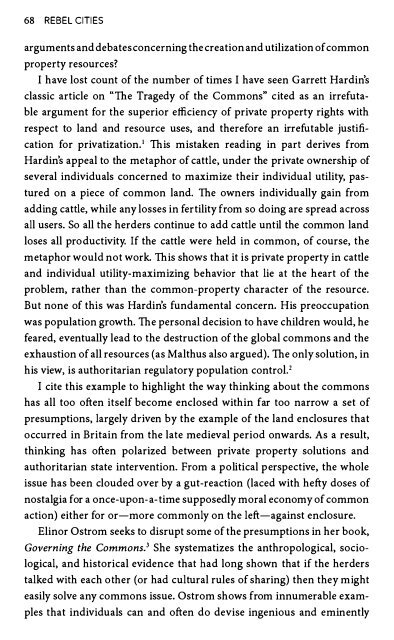Rebel Cities-David Harvey
Rebel Cities-David Harvey
Rebel Cities-David Harvey
- No tags were found...
Create successful ePaper yourself
Turn your PDF publications into a flip-book with our unique Google optimized e-Paper software.
68 REBEL CITIESarguments and debates concerning the creation and utilization of commonproperty resources?I have lost count of the number of times I have seen Garrett Hardin'sclassic article on "The Tragedy of the Commons" cited as an irrefutableargument fo r the superior efficiency of private property rights withrespect to land and resource uses, and therefore an irrefutable justificationfor privatization.1 This mistaken reading in part derives fromHardin's appeal to the metaphor of cattle, under the private ownership ofseveral individuals concerned to maximize their individual utility, pasturedon a piece of common land. The owners individually gain fromadding cattle, while any losses in fertility from so doing are spread acrossall users. So all the herders continue to add cattle until the common landloses all productivity. If the cattle were held in common, of course, themetaphor would not work. This shows that it is private property in cattleand individual utility-maximizing behavior that lie at the heart of theproblem, rather than the common-property character of the resource.But none of this was Hardin's fundamental concern. His preoccupationwas population growth. The personal decision to have children would, hefeared, eventually lead to the destruction of the global commons and theexhaustion of all resources (as Mal thus also argued). The only solution, inhis view, is authoritarian regulatory population controJ.2I cite this example to highlight the way thinking about the commonshas all too often itself become enclosed within far too narrow a set ofpresumptions, largely driven by the example of the land enclosures thatoccurred in Britain from the late medieval period onwards. As a result,thinking has often polarized between private property solutions andauthoritarian state intervention. From a political perspective, the wholeissue has been clouded over by a gut-reaction (laced with hefty doses ofnostalgia for a once-upon-a-time supposedly moral economy of commonaction) either for or-more commonly on the left-against enclosure.Elinor Ostrom seeks to disrupt some of the presumptions in her book,Governing the Commons. 3 She systematizes the anthropological, sociological,and historical evidence that had long shown that if the herderstalked with each other (or had cultural rules of sharing) then they mighteasily solve any commons issue. Ostrom shows from innumerable examplesthat individuals can and often do devise ingenious and eminently


